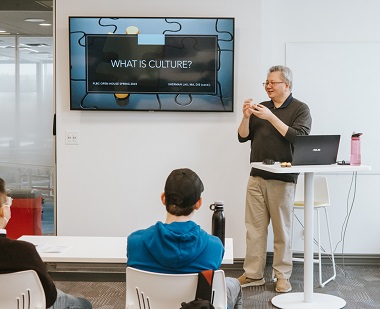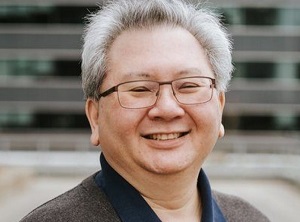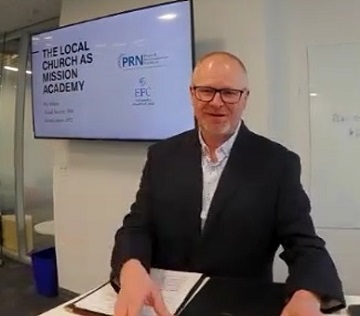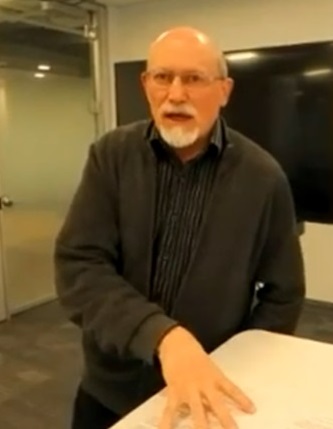
Sherman Lau teaches at Pacific Life Bible College and made a presentation during the EMS conference.
I had a couple of pleasant revelations last Friday morning (March 31), when I attended the annual conference of the Evangelical Missiological Society. First, the venue. Second, the content.
Pacific Life Bible College
I have known about Pacific Life Bible College (PLBC) for decades. I even visited it a couple of times, many years ago. The impression I was left with was that one turned off 152nd Street onto a quiet street into a semi-rural area. Not south Surrey, but quite a way down there.
When I turned up for the conference, I discovered that the college is now surrounded by suburban housing. And that the land is now shared by Regent Christian Academy and Horizon Church, which seem to be the primary inhabitants of the new buildings. (Christ College, which had also been based in Surrey, amalgamated with PLBC in 2014.)
Well, it turned out that I had not turned up at the conference, not having read the small print carefully enough. The gathering was in fact being held at PLBC’s ‘city campus’ in the midst of the new Health and Technology District of Surrey Central. What a surprise! The college now occupies (since late 2021) the full fourth floor of City Centre 2, just near the corner of King George Boulevard and 96th Avenue.
I spent my time in a couple of the classrooms, which look out on the surrounding city. The enclosed entrance to PLBC has a light and open feeling, and there is even a 5,000 square foot terrace where one can relax and socialize.
All in all, I suspect the students are quite pleased with the new location. I believe the old building, still surrounded by lots of green space, is mainly used for the music program, given that the highrise neighbours might not appreciate the volume which would sometimes accompany the learning.
Evangelical Missiological Society
I may be wrong, but I don’t think most people know much about the Evangelical Missiological Society in Canada (EMS) – which is a shame, because their members are working on a number of projects which will prove valuable to local churches and their leaders.
There was ample evidence of that work during the conference.
The EMS is “a professional academic society with several hundred members comprised of missiologists, mission administrators, teachers, pastors with strategic missiological interests and students of missiology, based primarily in North America but inclusive of members globally.”
This conference was focused on ‘Educating for Contemporary Mission.’ Two venues – PLBC in Surrey and Tyndale University in Toronto each featured their own line-up of speakers, though there was some overlap.
Three presentations at PLBC particularly caught my attention, partly because they featured local speakers and/or local topics. Here is a very brief introduction (given the depth of the material presented).
Sherman Lau

Sherman Lau
Sherman Lau, who directs the Intercultural Ministry Program at PLBC and serves as Lead Pastor at Killarney Park Church in Vancouver, presented a (28-page) paper on ‘The Influence of Canadian Multiculturalism on Ethnic Diversity in Evangelical Churches in Vancouver, British Columbia.’
Lau introduced his talk by pointing to the central place of multiculturalism in Canadian society, and asking how Christians and churches have related to those cultural norms.
He then stated:
. . . If Canadian multiculturalism is to be heralded as the platform for fulfilling the vision to overcome ethnocultural barriers and to reflect Kingdom values that model how the people of God overcome such barriers, then we must gain an understanding of the extent to which Canadian multiculturalism influences ethnic diversity in the life and ministry of evangelical congregations in Metro Vancouver.
He compared the results of his own “mixed-methods research” with several Focus Canada (Environics Institute) reports on Canadian response to issues of immigration and multiculturalism / minority groups / refugees.
Noting that these surveys did not include data on the participants’ religious beliefs, Lau sought to:
i) understand the degree to which Canadian Christians paralleled the opinions of their fellow Canadians; and
ii) what the primary influencers were in shaping their views on immigration and multiculturalism.
He presented question from the Environics Institute 2015 survey to a targeted audience of adults who professed an evangelical Christian faith and were attendees or members of an evangelical Christian church in the Metro Vancouver area. He followed up by interviewing some of the participants.
He concluded, in part:
The research suggests that overall Canadian Christians in Metro Vancouver mirror the attitudes and views of mainstream Canadians regarding immigration and multiculturalism. Where they differ is in their view of refugees, most likely since Christian congregations have a history of welcoming refugees and immigrants [more] than most Canadians. . . . .
The interview results reveal Canadian Christians in Metro Vancouver were motivated more by the Scriptural ethic of welcome and hospitality than by the government policy of multiculturalism, which was in effect more in their cognitive background rather than their spiritual foreground.
Homogeneous congregations welcomed ethnic diversity, though they may not have been intentionally discipled to do so nor to cultivate an intercultural ecclesiology. Functionally, Canadian Christians were cognizant of the privilege they had in living in Canada and wanted to share the wealth of the land with newcomers; while spiritually, the impetus to be hospitable provided an opportunity for evangelism. . . .
However, often, these congregations were not intentional in preparing their congregants for their engagement with ethnic groups different than their own. Furthermore, attempts at being intercultural by appropriating symbols and practices, while helpful, did not really advance integration of the diverse ethnic groups represented.
This offers a mere taste of Lau’s presentation, which was in turn taken from his 146-page dissertation, presented to the faculty of Western Seminary, Oregon December 19, 2022.
Phil Wagler

Phil Wagler speaking on ‘The Local Church as Mission Academy.’ Image from video
Phil Wagler is Global Director of the World Evangelical Alliance’s Peace & Reconciliation Network and Global Liaison for the Evangelical Fellowship of Canada. He lives in Kelowna, but was a pastor for several years in the Metro Vancouver area.
Here is the abstract for his (12-page) paper, ‘The Local Church as Mission Academy’:
Dallas Willard spoke of the church as an “academy of life” where people learn how to live. What if, corollary to that, the local church is also perceived as the academy of mission, where people learn how to join God in his mission to reconcile all things to himself through Christ?
In this paper, we will point to the local church as the first and most necessary place of mission education. The local church is best positioned for an inter-generational and inter-disciplinary centre for training up Christians for missionary service in the whole of life, and in a pluralistic society, inter-culturally.
Central to this is the formation not only of mission skill, but Christian character, the embodiment of reconciliation in its fullness, and communal life that is central to the mission of God in the world.
Part of this paper will also examine examples of where the move toward the local church as mission academy is being attempted (for example, seminaries using local churches as teaching centres) and new models may be seen to be emerging.
You can follow Wagler on his ‘All Things Reconciled’ blog and podcast.
Mark Naylor

Mark Naylor speaking on ‘Competency Based Theological Education for Intercultural Contexts.’ Image from video
Mark Naylor is Coordinator for Intercultural Leadership Development at Northwest Seminary & College, a founding member of ACTS Seminaries at Trinity Western University. He presented a (19-page) paper which he co-wrote with Ken Jolley and Andrés Rincón: ‘Competency Based Theological Education for Intercultural Contexts: A cooperative model between academy, assembly and agency.’
Beginning with comments about how much better prepared he could have been for his 14-year stint as a cross-cultural worker in Pakistan, he spoke about the importance of “forming passionate, competent change agents with wise, experienced mentors.”
Here is some of the abstract of the paper:
Northwest Baptist Seminary has pioneered a model of Competency Based Theological Education (CBTE) that emerged from the integration of church ministry (assembly) and theological education (academy) resulting in an innovative and ATS fully accredited MDiv program for pastoral training. . . .
The research focuses on those CBTE aspects that differ significantly from traditional degree programs in higher education. This includes:
-
- Competence- versus course-based assessments
- Holistic application of knowledge, skills and character in ministry setting
- Practices and habits conducive to longevity and effectiveness in ministry
- Collaborative partnership between agency, assembly and academy
- Value of team-based mentoring
- Direct relevance of assignments to ministry with flexibility based on developmental needs of the student
- Priority on context-based learning as opposed to classroom experience
- Flexibility in content, scheduling, and methodology
Naylor has a number of publications, including several in Sindhi, with the Pakistan Bible Society.
Anyone who would like to learn more about the Evangelical Missiological Society, or the conference, or who would like access to the papers presented (and his dissertation) can contact Sherman Lau at [email protected].
